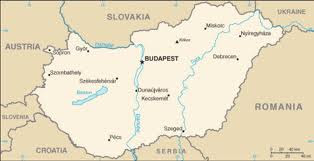 I've been to Hungary twice so far. In 2010 I spent a weekend in the capital Budapest and last year I visited Győr. Next week I'm off to spend a weekend in Székesfehérvár so here's a bit about the country.
I've been to Hungary twice so far. In 2010 I spent a weekend in the capital Budapest and last year I visited Győr. Next week I'm off to spend a weekend in Székesfehérvár so here's a bit about the country.Hungary has almost 10 million people and is located in Central Europe. The landlocked country borders Austria, Croatia, Romania, Serbia, Slovakia, Slovenia, and Ukraine. Hungary is slightly smaller than Indiana.
 In 1000 A.D., Hungary became a Christian kingdom and served as a buffer against Turkish expansion in to Europe. Eventually it became part of the Hapsburg Empire. As part of the Austro-Hungarian Empire, it was a superpower before it was defeated in WWI. Hungary joined the Axis Powers and found itself on the losing side of WWII. After the war, the communists took control and Hungary joined the Warsaw Pact.
In 1000 A.D., Hungary became a Christian kingdom and served as a buffer against Turkish expansion in to Europe. Eventually it became part of the Hapsburg Empire. As part of the Austro-Hungarian Empire, it was a superpower before it was defeated in WWI. Hungary joined the Axis Powers and found itself on the losing side of WWII. After the war, the communists took control and Hungary joined the Warsaw Pact.In 1956, there was a revolt against communist rule which was put down by Russian tanks. During the mid-1980's Hungary's economy began to open up, in what was called "Goulash Communism". The first free elections were held in 1990 and today it is a parliamentary democracy. In 1999, Hungary joined NATO and it joined the EU in 2004.
 It seems that other countries always have a problem with Hungarians. After WWI, the borders changed and many ethnic Hungarians found themselves living in other countries. The same thing happened after WWII. Today there are tensions in Slovakia between Slovaks and its nearly 10% ethnic Hungarian minority. Romania also has issues with its large ethnically-Hungarian population. Vojvodina, is the northern province in Serbia and it too has a large Hungarian presence. I suppose this is what happens when you end up on the losing side of two world wars. It probably doesn't help that the Hungarian language is distinctive and not comprehensible to anyone else. To me, Hungarian just sounds like Klingon.
It seems that other countries always have a problem with Hungarians. After WWI, the borders changed and many ethnic Hungarians found themselves living in other countries. The same thing happened after WWII. Today there are tensions in Slovakia between Slovaks and its nearly 10% ethnic Hungarian minority. Romania also has issues with its large ethnically-Hungarian population. Vojvodina, is the northern province in Serbia and it too has a large Hungarian presence. I suppose this is what happens when you end up on the losing side of two world wars. It probably doesn't help that the Hungarian language is distinctive and not comprehensible to anyone else. To me, Hungarian just sounds like Klingon.  Of course, the Hungarian government tends to instigate trouble such as now offering Hungarian passports to all ethnic Hungarians living outside of the country, like to Slovaks, Romanians and Serbians living just over the borders.
Of course, the Hungarian government tends to instigate trouble such as now offering Hungarian passports to all ethnic Hungarians living outside of the country, like to Slovaks, Romanians and Serbians living just over the borders.However, right now the biggest problem is its economy. Only about 50% of the working age population is currently employed. Then last year, the government basically re-nationalized the private pension system by redirecting funds from the required private pension scheme to the state in order to pay off government debt. Now the government is in trouble with the European Central Bank over how it's handling its Swiss mortgage crisis.
 Back in 2005, mortgages written in Swiss Francs were around 4% while interest rates in Hungarian Forints were in double digits. At the time, one Franc got you 160 Forint so roughly 2/3rds of Hungarian mortgages (~$22 billion) were taken out in Francs. That was fine when the Franc was weaker but after the global financial crisis and the problems in the Eurozone, the Franc has gotten stronger and the Forint has dropped 40% in value. One Franc is now about 243 Forint.
Back in 2005, mortgages written in Swiss Francs were around 4% while interest rates in Hungarian Forints were in double digits. At the time, one Franc got you 160 Forint so roughly 2/3rds of Hungarian mortgages (~$22 billion) were taken out in Francs. That was fine when the Franc was weaker but after the global financial crisis and the problems in the Eurozone, the Franc has gotten stronger and the Forint has dropped 40% in value. One Franc is now about 243 Forint. Monthly mortgage payments increased 40% and people owed more than they had originally borrowed. So the government began offering fixed rate loans (at 180 Forint to the Franc) to people in order to keep them from defaulting on their mortgages. But this scheme forces banks (mostly Austrian banks - like mine) to assume the losses from this artificial exchange rate.
Monthly mortgage payments increased 40% and people owed more than they had originally borrowed. So the government began offering fixed rate loans (at 180 Forint to the Franc) to people in order to keep them from defaulting on their mortgages. But this scheme forces banks (mostly Austrian banks - like mine) to assume the losses from this artificial exchange rate.Well, I've had fun the last two times I was in Hungary so I'm sure I will enjoy next week's visit. Maybe my little bit of tourist money will help out the local economy.


























No comments:
Post a Comment